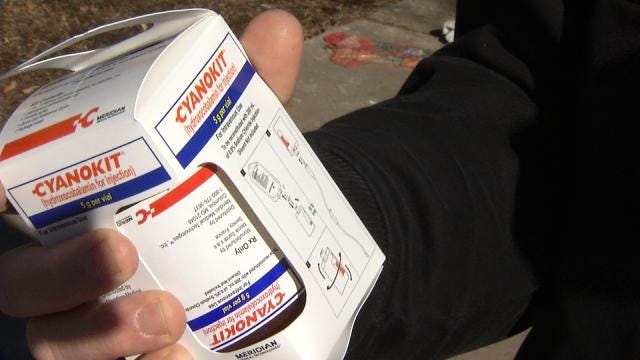TFD: New Medicine Helps Save Smoke-Inhalation Victims
A new tool can help to take toxins out of the body, and might be the reason all five victims of a west Tulsa house fire are alive.Tuesday, February 3rd 2015, 10:31 pm
A new tool can help to take toxins out of the body, and might be the reason all five victims of a west Tulsa house fire are alive.
The new medicine is meant to help people that have inhaled smoke.
Tulsa firefighters call it “raspberry Kool-Aid” because the medicine is a pink, glittery powder. It doesn't sound serious, but firefighters said it helped one of Monday's victims breathe on her own after going into cardiac arrest.
Monday's house fire took every type of training Tulsa firefighters had.
The front yard became triage, and an orange box could be the difference between life and death for three of the victims.
Tulsa Fire EMS Chief, Michael Baker said, "It may make the difference on how much toxic exposure someone has."
Firefighters pulled five people from the burning home and a woman, a man and one of the three children received the medicine in an IV.
2/3/2015 Related Story: Boy Hurt In Tulsa House Fire Undergoes Surgery In Texas
“We have to mix it. So we have to use all these nice little medical grade fittings and then we mix it with just normal IV fluids," Baker said.
When a home catches fire, it burns plastics and other materials which can emit cyanide.
Victims with smoke inhalation can have those toxins in their bloodstream, but the Cyanokit pulls poison out of the body.
"Literally binds with the cyanide in the body and they actually converge it to a B vitamin and it goes out through your urine," Baker explained.
It costs $800.
Tulsa firefighters have six kits, one for each fire chief and one for the EMS supervisor.
Baker said, "Really it's changed the survivability of a house fire or somebody that's involved in a toxic smoke event."
He said the woman in Monday's fire needed it most after going into cardiac arrest.
2/2/2015 Related Story: Tulsa Firefighters Pull 2 Adults, 3 Children From Burning House
Firefighters pushed a tube down her air way, then, prepared the Cyanokit.
"Anybody that's confined that would have soot or anything around their nose and mouth, or would have been in that enclosed environment is going to get the kit," Baker said.
They save the kits for victims with severe smoke inhalation that they can tell can hardly breathe, but could still survive.
Firefighters have had the kits since late 2013, and have used seven in the past year.
The department already ordered kits to replace the three used Monday.
More Like This
February 3rd, 2015
April 15th, 2024
April 12th, 2024
March 14th, 2024
Top Headlines
April 19th, 2024












